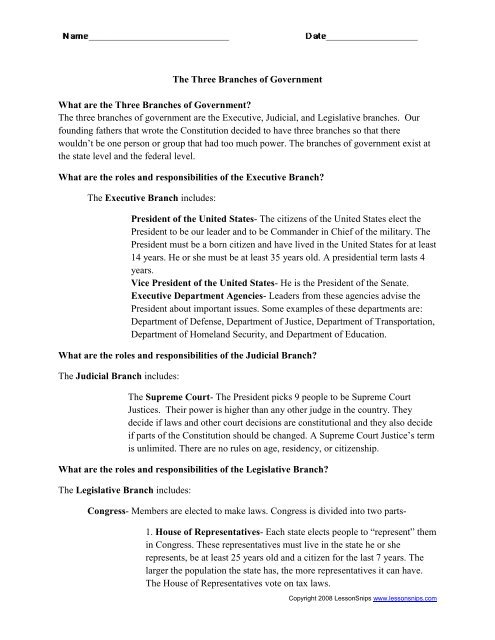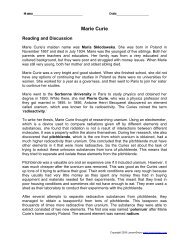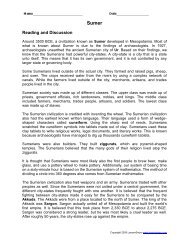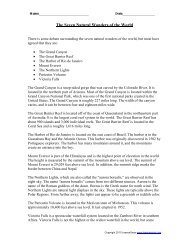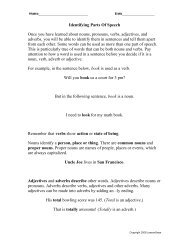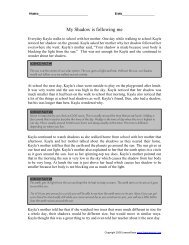The Three Branches of Government - LessonSnips
The Three Branches of Government - LessonSnips
The Three Branches of Government - LessonSnips
You also want an ePaper? Increase the reach of your titles
YUMPU automatically turns print PDFs into web optimized ePapers that Google loves.
<strong>The</strong> <strong>Three</strong> <strong>Branches</strong> <strong>of</strong> <strong>Government</strong><br />
What are the <strong>Three</strong> <strong>Branches</strong> <strong>of</strong> <strong>Government</strong>?<br />
<strong>The</strong> three branches <strong>of</strong> government are the Executive, Judicial, and Legislative branches. Our<br />
founding fathers that wrote the Constitution decided to have three branches so that there<br />
wouldn’t be one person or group that had too much power. <strong>The</strong> branches <strong>of</strong> government exist at<br />
the state level and the federal level.<br />
What are the roles and responsibilities <strong>of</strong> the Executive Branch?<br />
<strong>The</strong> Executive Branch includes:<br />
President <strong>of</strong> the United States- <strong>The</strong> citizens <strong>of</strong> the United States elect the<br />
President to be our leader and to be Commander in Chief <strong>of</strong> the military. <strong>The</strong><br />
President must be a born citizen and have lived in the United States for at least<br />
14 years. He or she must be at least 35 years old. A presidential term lasts 4<br />
years.<br />
Vice President <strong>of</strong> the United States- He is the President <strong>of</strong> the Senate.<br />
Executive Department Agencies- Leaders from these agencies advise the<br />
President about important issues. Some examples <strong>of</strong> these departments are:<br />
Department <strong>of</strong> Defense, Department <strong>of</strong> Justice, Department <strong>of</strong> Transportation,<br />
Department <strong>of</strong> Homeland Security, and Department <strong>of</strong> Education.<br />
What are the roles and responsibilities <strong>of</strong> the Judicial Branch?<br />
<strong>The</strong> Judicial Branch includes:<br />
<strong>The</strong> Supreme Court- <strong>The</strong> President picks 9 people to be Supreme Court<br />
Justices. <strong>The</strong>ir power is higher than any other judge in the country. <strong>The</strong>y<br />
decide if laws and other court decisions are constitutional and they also decide<br />
if parts <strong>of</strong> the Constitution should be changed. A Supreme Court Justice’s term<br />
is unlimited. <strong>The</strong>re are no rules on age, residency, or citizenship.<br />
What are the roles and responsibilities <strong>of</strong> the Legislative Branch?<br />
<strong>The</strong> Legislative Branch includes:<br />
Congress- Members are elected to make laws. Congress is divided into two parts-<br />
1. House <strong>of</strong> Representatives- Each state elects people to “represent” them<br />
in Congress. <strong>The</strong>se representatives must live in the state he or she<br />
represents, be at least 25 years old and a citizen for the last 7 years. <strong>The</strong><br />
larger the population the state has, the more representatives it can have.<br />
<strong>The</strong> House <strong>of</strong> Representatives vote on tax laws.<br />
Copyright 2008 <strong>LessonSnips</strong> www.lessonsnips.com
What are Checks and Balances?<br />
2. Senate- Each state elects 2 people to the Senate. <strong>The</strong>y are called<br />
Senators. A Senator must live in the state he or she represents, be at least<br />
30 years old and a citizen for the last 9 years. <strong>The</strong> Senate looks at<br />
decisions the President has made and decides if they agree with the<br />
President. <strong>The</strong> Senate also has the power to impeach the President.<br />
Even though there are <strong>Three</strong> <strong>Branches</strong> <strong>of</strong> <strong>Government</strong>, they are not are not at all separate.<br />
Checks and Balances allow each branch to check on other braches to make sure they are doing<br />
what is constitutional.<br />
Executive Branch- <strong>The</strong> President checks on the courts by deciding who gets to<br />
be the judges and he can also give pardons to people who committed a federal<br />
crime. <strong>The</strong> President also checks on Congress by calling special sessions,<br />
suggesting new laws, and he also has the power to veto any laws Congress has<br />
made.<br />
Judicial Branch- <strong>The</strong> Supreme court checks on the President by making sure<br />
he doesn’t make any unconstitutional acts. <strong>The</strong> Supreme Court also makes sure<br />
the Congress remains constitutional with any <strong>of</strong> their acts.<br />
Legislative Branch- Congress can impeach the President and federal judges.<br />
Congress can also override presidential decisions.<br />
Copyright 2008 <strong>LessonSnips</strong> www.lessonsnips.com
Questions for Reflection<br />
1. What is the purpose <strong>of</strong> having three branches <strong>of</strong> government?<br />
______________________________________________________________________________<br />
______________________________________________________________________________<br />
______________________________________________________________________________<br />
2. What branch would the governor <strong>of</strong> a state belong to? Why?<br />
______________________________________________________________________________<br />
______________________________________________________________________________<br />
______________________________________________________________________________<br />
3. Name two advantages to limiting terms <strong>of</strong> government <strong>of</strong>fices:<br />
______________________________________________________________________________<br />
______________________________________________________________________________<br />
______________________________________________________________________________<br />
4. Complete the chart:<br />
President<br />
Supreme Court<br />
Justice<br />
Representative<br />
Senator<br />
FEDERAL OFFICE TERMS AND REQUIREMENTS<br />
Term Limit Minimum Age Residency<br />
Requirements<br />
Citizenship<br />
Rules<br />
Copyright 2008 <strong>LessonSnips</strong> www.lessonsnips.com
5. Compare and contrast a House Representative to a Senator:<br />
Senator House Representative<br />
Open-Response:<br />
In what ways are the Supreme Court and Congress alike? In what ways are they different?<br />
Give two details from the text to support how they are alike. Give two details from the text<br />
to support how they are different.<br />
______________________________________________________________________________<br />
______________________________________________________________________________<br />
______________________________________________________________________________<br />
______________________________________________________________________________<br />
______________________________________________________________________________<br />
______________________________________________________________________________<br />
______________________________________________________________________________<br />
______________________________________________________________________________<br />
______________________________________________________________________________<br />
______________________________________________________________________________<br />
______________________________________________________________________________<br />
______________________________________________________________________________<br />
Copyright 2008 <strong>LessonSnips</strong> www.lessonsnips.com
<strong>Three</strong> <strong>Branches</strong> <strong>of</strong> <strong>Government</strong><br />
KEY-<br />
1. <strong>The</strong> purpose for having three <strong>Branches</strong> <strong>of</strong> <strong>Government</strong> are to ensure peoples’<br />
constitutional rights are protected and that not one person or group could not have<br />
too much power or control.<br />
2. <strong>The</strong> governor <strong>of</strong> a state would be a part <strong>of</strong> the executive branch on the state level<br />
because it is equivalent to the president on the federal level.<br />
3. Two advantages to limiting terms (answers could vary some). Here are some<br />
possibilities: New people to <strong>of</strong>fice means new laws, new ideas, a different perspective<br />
or point <strong>of</strong> view on issues<br />
4.<br />
Term Limit Minimum Age Residency<br />
Requirements<br />
President 4 years 35 live in United<br />
States 14 years<br />
Supreme Court<br />
Justice<br />
Unlimited None None None<br />
Representative 2 years 25 Live in state in<br />
which elected<br />
Senator 6 years 30 Live in state in<br />
which elected<br />
Citizenship<br />
Rules<br />
Natural- born<br />
citizen<br />
7 years<br />
9 years<br />
5. House Alike Senate<br />
Must be 25 live in state elected Must be 30<br />
2 year term make laws 6 year term<br />
Citizen 7 years elected to <strong>of</strong>fice citizen 9 years<br />
state population effects # <strong>of</strong> representatives state only elects 2 Senators<br />
vote on tax laws has power to impeach<br />
Copyright 2008 <strong>LessonSnips</strong> www.lessonsnips.com
Possible answers for the open response-<br />
<strong>The</strong> Supreme Court and Congress are alike:<br />
<strong>The</strong>y both do checks and balances on the Executive Branch. Examples from the text are “<strong>The</strong><br />
Supreme court checks on the president by making sure he doesn’t make any unconstitutional<br />
acts” and “Congress can also override presidential decisions.”<br />
<strong>The</strong> Supreme Court and Congress are different:<br />
Congress makes the laws and can “impeach any <strong>of</strong> the Supreme Court Judges.”<br />
<strong>The</strong> Supreme Court decides if the laws are unconstitutional and “also makes sure the Congress<br />
remains constitutional with any <strong>of</strong> their acts.”<br />
Copyright 2008 <strong>LessonSnips</strong> www.lessonsnips.com


